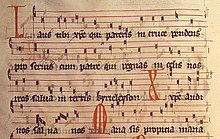Laus tibi, Christian



Laus tibi, Christe, qui pateris (“Praise you, Christ, who you suffer”) is a medieval Latin song verse for Holy Week . It is almost at the same time, with the same melody, also as a German Leise Ehre be dich, Christe, to whom you suffered hardship testifies. Out of the numerous verse versions of the late Middle Ages, the verse O you poor Judas, what have you done, gained outstanding popularity. In Protestant church chant, the song is still today through the version by Hermann Bonnus O we poor sinners! Our wrongdoing present.
Lore history
Laus tibi, Christian - Glory to you, Christian
The earliest evidence of the Latin Laus tibi, Christe can be found with the monk of Salzburg around 1350. Linguistic evidence suggests that the - somewhat later documented - German Leise Ehre be you, Christe was the model and was possibly translated into Latin in Bohemia . So the verse belongs beside Christ is risen to the oldest layer of the German church song and is the nucleus of all later Passion seal . She served as the refrain of the people to the hymn Rex Christe, factor omnium in mourning Metten on Holy Thursday , Good Friday and Holy Saturday .
With the honorable invocation of Jesus , the memory of his suffering and death "for us" ("pro miseris"), the confession of his omnipotence and the request for the salvation he has achieved, the stanza can be regarded as a short formula of the Christian faith.
O poor Judas
In addition to the memorable melody, new stanzas and series of stanzas about the suffering of Jesus were created in the 14th century, probably originally in connection with the Passion Play . One of these songs, Eya of Great Love , ended with the verse O you poor Judas . This became independent, was added to Laus tibi, Christe in Latin (O tu miser Juda) and combined with various other stanzas in German and also passed on alone:
- O you poor Judas, what have you done
- that you betrayed your masters!
- That is why you have to suffer in hell pain
- You must be Lucifer's companion forever.
- Kyrieleison.
The stanza was so popular in the 15th and 16th centuries that the melody was identified with and named after this text. When the emperor's son Maximilian and his court went down the Danube in 1490 and the imperial city of Regensburg did not open its gates to him, the musicians on the ship are said to have played the Judas melody on Maximilian's orders, and everyone in the audience knew what was meant. Verses of mockery in the same meter with beginnings like "O du armer ...", "O du arger ..." arose on countless occasions in public life, not least in the course of the Reformation polemics .
Up until the 17th century, the idioms “sing to poor Judas” meant mocking him and “having to sing poor Judas” in dire need.
O we poor sinners
Hermann Bonnus created a Lutheran adaptation of the song in 1542. The opening line “O we poor sinners! Our iniquity ”is an intended counterfactor to“ O you poor Judas, what have you done ”. The following five doctrinal stanzas develop the Lutheran doctrine of justification . The conclusion is the old glory to you, Christian .
The song remained in the shadow of other Reformation and Baroque passion songs. It is missing in the German Evangelical Church Hymnbook from 1854 and in the German Evangelical Hymnbook from 1915. Otto Riethmüller recorded four of Bonnus' stanzas and, as a separate song, Let the honor be you, Christe in his youth hymn book Ein neue Lied (1932). The Evangelical Church Hymnal then brought Bonnus' full text with minor linguistic adjustments. A three-verse version was created for the Evangelical Hymnbook , which begins with the old honor be you, Christe and contains Bonnus' verses 3 and 6.
In God's praise (1975) there is the one-strophic Ehre sei dir, Christe in a slightly different melody as a song to open the fifth series of the mass chants (No. 499); it is marked there as an ö song . In God's praise (2013) including the diocesan parts it is missing.
Text in the Evangelical Church Hymnbook and in the Evangelical Hymnal
| EKG (1950) No. 57 |
EG (1993) No. 75 |
|
1. O we poor sinners! Our iniquity, |
1. Glory to you, Christian, who suffered hardship, |
melody
The has a memorable, declamatory character due to the four-fold tone repetitions at the beginning of each line. Differences in the traditional form result from the varying number of the final Kyrie calls as well as from adjustments to text lines with an upbeat or without an upbeat . In the 15th and 16th centuries it was one of the most famous ways of singing ("O du armer Judas"). But even in Johann Sebastian Bach's work it only appears marginally.
literature
- Franz Karl Praßl : 75 - Glory to you, Christian . In: Gerhard Hahn , Jürgen Henkys (Hrsg.): Liederkunde zum Evangelisches Gesangbuch . No. 10 . Vandenhoeck & Ruprecht, Göttingen 2004, ISBN 3-525-50333-4 , pp. 35–40 ( limited preview in Google Book search).
- Christina Falkenroth: O we poor sinners . In: This: The Passion of Jesus in the hymn: "Those who look at him will shine with joy ..." Tübingen 2017 ( online )
- Rochus von Liliencron : German life in folk songs around 1530 . Berlin / Stuttgart 1884, pp. LII – LV
Web links
Individual evidence
- ^ Liliencron, S. LV
- ↑ cf. Martin Luther's Ah you arger Heintze at the end of his work Wider Hans Worst , WA 51 p. 470
- ↑ University of Graz
- ^ German Evangelical Church Hymnbook
- ↑ cf.
- ^ Choral movement BWV 407 ( sheet music ), chorale arrangement BWV 1097, an early work
